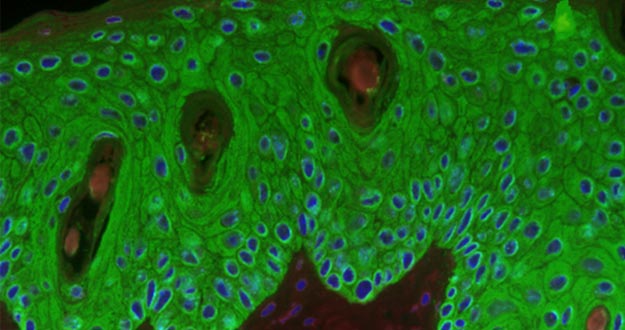Researchers at the National Cancer Research Centre (CNIO) have helped to unveil a new mechanism, that regulates the differentiation of the cells, that make up most of the epidermis, the keratinocytes.

Keratinocytes, with green colour, in the skin of a mouse
In addition to discovering one of the key links in the formation of the skin, they have described this mechanism could be involved in skin cancer, as published in the journal Genes & Development, with Stefanie Wurm, as the first author, and directed by Erwin Wagner, head of the BBVA Foundation-CNIO of Cancer Cell Biology program.
And in the formation of human skin involves a cascade of not yet well known biochemical signals; but very important, since their failures cause diseases, that affect more than a quarter of humanity, from atopic dermatitis to skin cancers.
Specifically, the authors have identified the Fra-2 protein, whose precise role in skin, until now it was not known, as a key element, in the differentiation of keratinocytes: if Fra-2 is not activated, there no differentiation and, therefore, the skin is not completely formed.
Human keratinocytes live about a month and, in that period, they go through a series of changes, related to the different functions, performed during its journey, from the deepest layer of the epidermis, where they are born, until the surface, with which our body touch outside.
This evolution of the keratinocyte is called differentiation. As the authors write: "in the epidermis, the induction of keratinocyte differentiation is essential for the acquisition of the barrier function of the skin, as well as homeostasis [Stability] of the Tissue".
In recent years, it has been unraveling the forest of biochemical signals, involved in the transformation of the keratinocytes and the epidermis formation.
We now know that the process is led by a plethora of genes, located in the so-called Epidermal Differentiation Complex (EDC). In turn, the expression of these genes is regulated by the coordinated interaction of biochemical signals, that send small proteins, like the transcription factors.
The work, now published, shows that Fra-2, one of those transcription factors, plays a key regulatory role. "With the help of specific mouse models, we show that the expression of Fra-2 in keratinocytes, also induce the expression of genes in the EDC", the authors write.
Conversely, it is enough the loss of Fra-2, in the keratinocytes of the suprabasal layer, to cause defects, that prevent the proper functioning of the skin, as a barrier, because it has been reduced the expression of genes EDC. They even found a possible link to cancer.
In mice, prone to develop benign skin tumors (papillomas), the risk of this occurring was reduced while activating Fra-2. The authors attributed to Fra-2 induces premature differentiation of carcinogenic keratinocytes.
Another novelty is related to the way in which the regulation of Fra-2 takes place. The work reveals that the activation or not of this transcription factor depends on the chemical changes, experienced by its interaction with Ezh2 and ERK1 / 2 enzymes, that works a real switch of Fra-2.
This activation method was not known, and researchers now want to study whether it is also involved, in other processes. "We describe a novel interaction of Fra-2 with Ezh2", explains Stefanie Wurm.
"Using techniques of mass spectroscopy, we identified a new posttranslational modification of Fra-2: when methylated by Ezh2 [methylation is a chemical modification, thanks to what the molecule gains a methyl group], Fra-2 remains inactive in the basal cells, and when it is phosphorylated ERK1 / 2 [addition of a phosphate group], it becomes active again".
This finding opens new avenues to explore "if this switch is a general mechanism for activating transcription factors", continues Wurm.
"We also want to study whether inhibition of Ezh2 may be a valuable therapeutic strategy, against skin diseases, related to failures, in keratinocyte differentiation."
Well, I hope that researches continue working, in order to eliminate diseases like Cancer, all over the world.
Until my next post, kind regards,
Luis.
Sponsored by Costaluz Lawyers.
Please click below:
